
The School of Advanced Military Studies (SAMS) is one of four United States Army schools that make up the United States Army Command and General Staff College (CGSC) at Fort Leavenworth, Kansas. This "enormously rigorous" graduate school comprises three programs: the larger Advanced Military Studies Program (AMSP); the Advanced Strategic Leadership Studies Program (ASLSP), a Joint Military Professional Education II certified senior service college program for senior field-grade officers, and the Advanced Strategic Planning and Policy Program (ASP3), which supports officers in obtaining doctorates from civilian schools.

The United States Army Command and General Staff College at Fort Leavenworth, Kansas, is a graduate school for United States Army and sister service officers, interagency representatives, and international military officers. The college was established in 1881 by William Tecumseh Sherman as the School of Application for Infantry and Cavalry, a training school for infantry and cavalry officers. In 1907 it changed its title to the School of the Line. The curriculum expanded throughout World War I, World War II, the Korean War, and the Vietnam War and continues to adapt to include lessons learned from current conflicts.

The Naval War College is the staff college and "Home of Thought" for the United States Navy at Naval Station Newport in Newport, Rhode Island. The NWC educates and develops leaders, supports defining the future Navy and associated roles and missions, supports combat readiness, and strengthens global maritime partnerships.
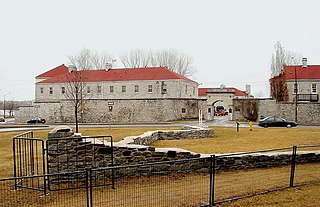
Fort Frontenac was a French trading post and military fort built in July 1673 at the mouth of the Cataraqui River where the St. Lawrence River leaves Lake Ontario, in a location traditionally known as Cataraqui. It is the present-day location of Kingston, Ontario, Canada. The original fort, a crude, wooden palisade structure, was called Fort Cataraqui but was later named for Louis de Buade de Frontenac, Governor of New France who was responsible for building the fort. It was abandoned and razed in 1689, then rebuilt in 1695.

Canadian Forces Base Suffield is a Canadian Forces base, host to the largest army training area in Canada. It is located in southeastern Alberta, 3 nautical miles north-northwest of Suffield, 50 km (31 mi) northwest of the city of Medicine Hat and 250 km (160 mi) southeast of Calgary. It is accessible via Highway 884, a public road that bisects the main hub section of the base.

The United States Army Training and Doctrine Command (TRADOC) is a major command of the United States Army headquartered at Fort Eustis, Virginia. It is charged with overseeing training of Army forces and the development of operational doctrine. TRADOC operates 37 schools and centers at 27 different locations. TRADOC schools conduct 1,304 courses and 108 language courses. The 1,304 courses include 516,000 seats for 443,231 soldiers; 36,145 other-service personnel; 8,314 international soldiers; and 28,310 civilians.

Lieutenant General William Pelham Yarborough was a senior United States Army officer. Yarborough designed the U.S. Army's parachutist badge, paratrooper or 'jump' boots, and the M42 airborne jump uniform. He is known as the "Father of the Modern Green Berets." He was descended from the Yorkshire House of Yarborough. Yarborough was a distant cousin to such British noble figures as the Baron Deramore, Lord Alvingham, the Duke of Buccleugh and the Marquess of Bath.
Staff colleges train military officers in the administrative, military staff and policy aspects of their profession. It is usual for such training to occur at several levels in a career. For example, an officer may be sent to various staff courses: as a captain they may be sent to a single service command and staff school to prepare for company command and equivalent staff posts; as a major to a single or joint service college to prepare for battalion command and equivalent staff posts; and as a colonel or brigadier to a higher staff college to prepare for brigade and division command and equivalent postings.
The Indian Defence services have established numerous academies and staff colleges across India for the purpose of training professional soldiers in military sciences, warfare command and strategy, and associated technologies.
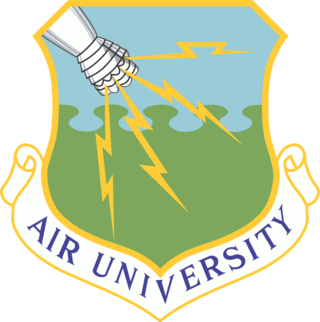
Air University is a professional military education university system of the United States Air Force. It is accredited by the Commission on Colleges of the Southern Association of Colleges and Schools to award master's degrees.
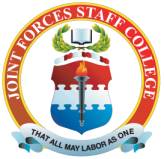
The Joint Forces Staff College (JFSC), located in Norfolk, Virginia, was established as the Armed Forces Staff College in 1946 and incorporated into the National Defense University in August 1981. It educates and acculturates joint and multinational warfighters to plan and lead at the operational level. Military operations increasingly require the Armed Services to work jointly, and JFSC provides students the tools to operate in a joint environment. JFSC is composed of three schools, each with different student populations and purposes.
The Defence Services Command and Staff College (DSCSC) is situated at Batalanda, Makola (South) 12 Kilometers away from Colombo and its aim to develop the professional knowledge and understanding of experienced officers of the Sri Lanka Army, Sri Lanka Navy & the Sri Lanka Air Force to prepare them for the ranks of junior field officers in the army and the respective ranks of the Navy and Air force. The DSCSC was formerly known as the Sri Lanka Army Command and Staff College (ACSC).
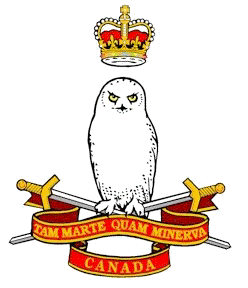
The Canadian Army Command and Staff College (CACSC), formerly the Canadian Land Force Command and Staff College, is a staff college for officers of the Canadian Armed Forces, specializing in staff and army operations courses. It is located at Fort Frontenac in Kingston, Ontario, Canada.

The National Defence College, located in New Delhi, is the defence service training institute and highest seat of strategic learning for officers of the Defence Service and the Civil Services. This is a very prestigious course attended only by a few hand-picked defence officers of One-Star rank and civil servants of the rank of Joint secretary to the Government of India. Each year, approximately 25 officers from friendly foreign countries like the US, UK, Canada, France, Germany, Australia, Vietnam, Sri Lanka, Nepal, UAE and others attend the course.
The Armed Forces Command and Staff College, Jaji is a training facility for the Nigerian Armed Forces, including the army, air force and navy. It is near the village of Jaji, Nigeria, about 35 km (22 mi) northeast of Kaduna in the Igabi Local Government Area (LGA) of Kaduna State, Nigeria. It is currently headed by Air Vice Marshal Hassan Alhaji.

The Royal Lao Armed Forces, best known by its French acronym FAR, were the official armed defense forces of the Kingdom of Laos, a state that existed from 1949 to 1975 in what is now the Lao People's Democratic Republic. First created under the French protectorate of Laos on July 1, 1949, the FAR was responsible for the defense of the Kingdom since its independence in October 1953 from France, until its dissolution on December 2, 1975. It operated notably during the North Vietnamese invasion of Laos and the Laotian Civil War from 1960 to 1975.

NATO Defense College (NDC) is the international military college for North Atlantic Treaty Organization countries. It is located in Rome, Italy.
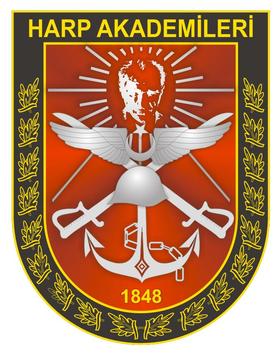
Turkish War Academies was an educational branch of the Turkish Armed Forces. It trained staff officers for Turkish Armed Forces.
The Sri Lankan Armed Forces have established numerous academies and staff colleges across Sri Lanka for the purpose of training professional soldiers in military sciences, warfare command and strategy, and associated technologies.
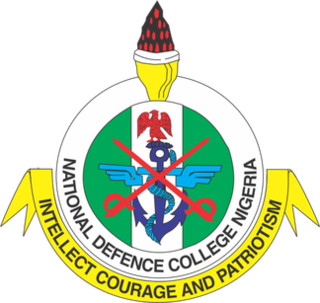
National Defence College (NDC), formerly known as the National War College (NWC), is an apex military training institution of Nigeria for senior military officer of the Nigeria Armed Forces.
















